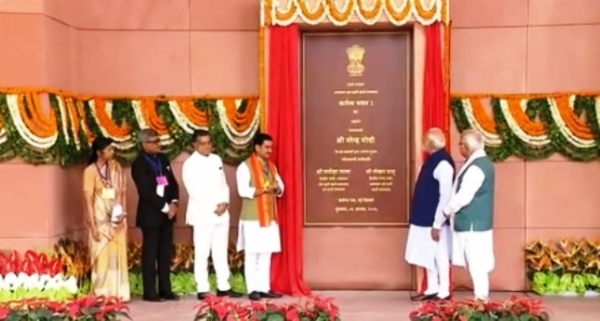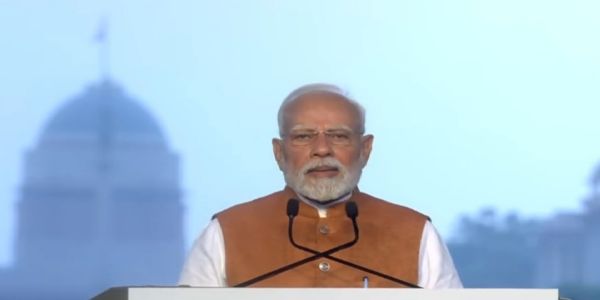
New Delhi, August 6 (H.S.) : Prime Minister Narendra Modi inaugurated the Kartavya Bhavan at Kartavya Path in Delhi on Wedneday as part of the larger Central Vista transformation project aimed at enhancing governance and administrative efficiency. This facility, designated as Kartavya Bhavan-03, is among the first of ten buildings planned for the new Common Central Secretariat, which seeks to modernize the Indian government's administrative framework.
The objective of Kartavya Bhavan-03 is to improve collaboration between different ministries and expedite policy execution. Currently, many ministries work from outdated buildings like Shastri Bhawan and Krishi Bhawan, built between the 1950s and 1970s, which are no longer efficient for modern governance. The new facility will house multiple ministries together, thereby fostering innovation and enhancing operational effectiveness.
Spanning 1.5 lakh square meters, Kartavya Bhavan-03 consists of two basements and seven floors, accommodating critical ministries such as Home Affairs, External Affairs, and Rural Development. The building is equipped with advanced IT-ready workspaces and incorporates high-security measures, including ID card access and integrated surveillance systems, enhancing its operational readiness.
Sustainability is a prominent aspect of Kartavya Bhavan-03, with design goals set to achieve a GRIHA-4 rating for energy efficiency. Features include double-glazed facades for thermal performance, rooftop solar panels, solar water heating systems, and modern HVAC systems. The building integrates rainwater harvesting solutions to minimize water waste and dependence on external resources.
Designed as a zero-discharge environment, the building can effectively process and recycle wastewater to meet a considerable portion of its water requirements. Additionally, recycled materials are used in construction, strategically employing construction and demolition waste for various applications, which also conserves local topsoil. Architectural features are designed to consume 30% less energy compared to standard buildings, employing specialized glass to mitigate heat gain and noise, alongside energy-saving LED lights and smart sensing technology for efficient power management.
The rooftop solar panels are estimated to generate approximately 5.34 lakh units of electricity annually, significantly contributing to the energy needs of the building. The solar water heating system will cover over 25% of the daily hot water requirements, and electric vehicle charging stations will facilitate eco-friendly transportation options for users.
With the launch of Kartavya Bhavan-03, the Indian government aims not only to modernize its infrastructure but also to keep pace with 21st-century governance demands, establishing responsive and coordinated offices that enhance agile decision-making processes. This development represents a critical step towards improving the effectiveness and efficiency of public administration in India.
In a later address, Prime Minister Modi is expected to elaborate on the vision that Kartavya Bhavan embodies for India's future in administration. The initiative is viewed as a significant enhancement of India's governance capabilities, ensuring that the administrative structure aligns with the nation's aspirations and policy objectives moving forward.
Union Minister for Housing and Urban Affairs, Manohar Lal, also highlighted the importance of this building during the inauguration, stating it will consolidate several major ministries and promote streamlined, transparent administrative operations, thus paving the way for a robust administrative infrastructure in India. The anticipated completion of the other nine buildings under the Central Vista project will further support these objectives, with a target to finish by December 2025 and transfer all ministries by April 2026.
Hindusthan Samachar / Jun Sarkar








